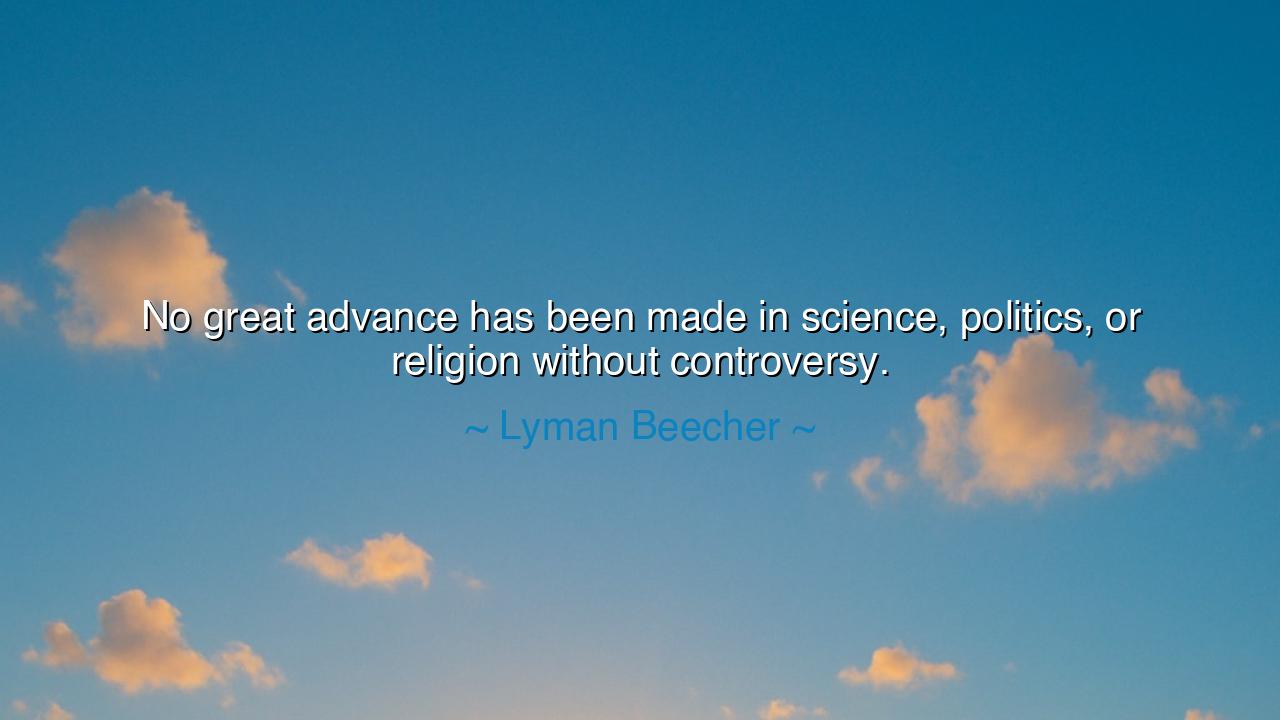
No great advance has been made in science, politics, or religion






In the grand arc of human history, there are certain moments that stand as testaments to progress, when new ideas, once seen as impossible or even dangerous, broke through the confines of conventional wisdom. These moments of advancement—whether in science, politics, or religion—often emerge from the tumult of controversy, a necessary force that challenges the status quo and clears the path for the new. Lyman Beecher, in his profound insight, offers us a timeless truth: "No great advance has been made in science, politics, or religion without controversy." These words, spoken by a prominent 19th-century minister, remind us that progress often comes not in peaceful agreement, but through the struggles and debates that shape the landscape of human thought.
The great figures of history who have pushed the boundaries of what was believed to be possible were not welcomed with open arms. The ancient Greek philosophers faced the same challenges in their time. When Socrates questioned the gods of Athens and challenged the traditional values of the city, he was seen as a subversive figure, even accused of corrupting the youth. His trial and execution stand as a powerful example of how the path to intellectual freedom is often marked by controversy. Yet, it was his uncompromising pursuit of truth that laid the foundation for much of Western philosophy, changing the course of thought for generations to come.
Similarly, Galileo Galilei, the brilliant astronomer of the Renaissance, found himself at the center of a fierce battle between science and the established doctrines of the Catholic Church. His support for the heliocentric model—the idea that the Earth revolved around the Sun—was met with fierce opposition, leading to his trial and house arrest. Yet, it was precisely this controversy that propelled humanity forward into a new era of scientific discovery. Galileo’s courage in standing by his findings, despite the opposition of religious authorities, exemplifies how controversy often precedes the greatest advancements in human understanding.
The same can be said of the realm of politics, where change often arises out of disruption and debate. One need only look at the American Revolution, which was itself the culmination of intense controversy between the colonists and the British Empire. The very notion of independence was revolutionary, shaking the foundations of an established world order. The Founding Fathers were not celebrated figures in their time; many were branded as traitors to the crown, and their ideas were seen as radical and unworkable. Yet, in the fires of controversy, the principles of democracy, freedom, and self-governance were born—principles that would go on to reshape the world.
In religion, too, great advances have often been met with resistance. The figure of Martin Luther comes to mind, as his 95 Theses on the practices of the Catholic Church sparked the Protestant Reformation, forever altering the religious landscape of Europe. Luther’s challenge to the church’s authority was not embraced by all; rather, it ignited a fierce theological debate that would lead to centuries of religious conflict. Yet, in the heat of this controversy, new understandings of faith, salvation, and grace emerged, challenging the established religious norms and offering new paths for believers to explore their spirituality.
Beecher’s insight on the necessity of controversy in advancement is not a call to embrace conflict for its own sake, but to recognize that true progress often requires confrontation with the forces that seek to preserve the status quo. Advancement in any field—whether intellectual, political, or spiritual—demands the courage to question, to challenge, and to push forward in the face of opposition. Without the voices of dissent, without those who dare to speak out against entrenched systems, the world would stagnate. It is through controversy that new ideas are tested, refined, and ultimately accepted by the wider society, leading to the growth of human knowledge and freedom.
The lesson from Beecher’s words is clear: advancement in all aspects of life often comes at a price. The journey toward greater understanding—whether in science, politics, or religion—is rarely smooth, and those who lead the way are often seen as rebels or radicals. Yet, the struggle itself is what drives progress. The courage to stand firm in the face of opposition, to push against the currents of complacency, and to defend what one believes to be true is the heart of progress. For each of us, this means that we must not shy away from controversy or disagreement when we encounter it in our lives. Instead, we must embrace the challenge, knowing that it is through debate and disagreement that we sharpen our ideas and grow into something greater.
In our own lives, we are called to question, to challenge, and to engage with the world around us. Whether in our careers, our personal relationships, or our spiritual journeys, the path to growth and understanding is rarely without conflict. But rather than fearing this struggle, we should welcome it as a necessary step toward the advancement of our own minds and spirits. As Lyman Beecher teaches us, true progress is born not from compliance with the status quo but from the courage to stand in the fire of controversy and emerge stronger, wiser, and more attuned to the ever-changing tides of human life.






AAdministratorAdministrator
Welcome, honored guests. Please leave a comment, we will respond soon